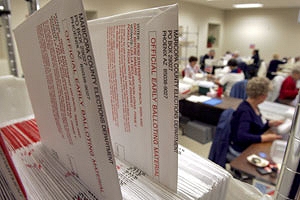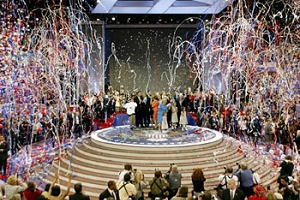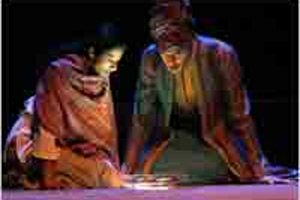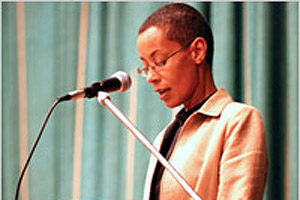Focus on America
No Presidential Nominees After Super Tuesday

When parties in 24 states scheduled primaries and caucuses for February 5 -- the most races ever on a single day in a primary election season -- most political experts said the parties’ nominees would be certain by the end of the day. The experts were wrong: After a record number of Americans voted on Super Tuesday, there is still no presumptive presidential nominee for either party, and the final delegate count still is being tallied.
All Democratic races and many Republican contests award delegates to the national convention by proportional representation. A candidate must win the support of a majority of convention delegates to become the party nominee.
On the Republican side, Arizona Senator John McCain’s strong showing in delegate-rich states helped him gain a large lead in delegates, but he still does not have enough delegates to claim his party’s nomination.
Because strong second-place finishers can win as many delegates as the top-placed candidate in a proportional race and because larger states award more delegates, the candidate who wins the most states might not come away with the most delegates. For instance, even though Illinois Senator Barack Obama won the Democratic popular vote in at least 13 of 24 states, New York Senator Hillary Clinton won the vote in the more populous Super Tuesday states, giving her an edge in terms of total delegates.
SURPRISE IN THE REPUBLICAN RACE
After recent primaries, the Republican race seemed to be a two-person contest between McCain and former Massachusetts Governor Mitt Romney. As polls anticipated, McCain won the most states and will receive significantly more delegates than any other Republican candidate.
McCain won states in many parts of the country: New England, where he won every state voting except Massachusetts; the Midwest with Oklahoma and Missouri; and the West, including his home state of Arizona. He also picked up wins in the most populous states -- Illinois, New York, New Jersey and California. The Republican races in New York and New Jersey award all their delegates to the winner, giving McCain a large advantage in total delegates.
“Tonight I think we must get used to the idea that we are the Republican Party front-runner for the nomination,” McCain told his supporters in Phoenix.
Romney earned victories in two states where he once had lived, Utah and Massachusetts. Some other Romney wins included the rural states of North Dakota, Montana and Alaska.
However, what political pundits expected to be a two-person race turned out to be a three-person contest with former Arkansas Governor Mike Huckabee winning five states, all in the South.
“Today people across this country are saying that, yes, we heard what the pundits said,” Huckabee told his supporters. “But this is our vote, not theirs.”
DEMOCRATS SPLIT STATES, DELEGATES
The race between Clinton and Obama continues to be tight after a Super Tuesday in which both candidates won states and delegates across the country.
It might take days to determine accurately how many delegates each earned. But, with proportional representation in all Democratic contests, neither candidate is likely to receive a windfall in total delegates as a result of the February 5 contests.
Clinton won the day’s smallest and largest contests. The tiny Pacific territory of American Samoa had a record turnout at its Democratic caucus in which a majority of its 285 participants selected Clinton. The New York senator also achieved victory in California, the most populous state in the United States. Nearly 3.7 million Californian Democrats cast ballots in that contest.
Clinton’s other victories were scattered across the country and included New Jersey, New York, Arizona, Oklahoma, Massachusetts and Tennessee.
Obama’s victories, also geographically diverse, included Utah, Minnesota, Alabama and Connecticut.
Although Clinton achieved victories in many of the most populous states, Obama won many of his states by large margins -- more than 60 percent of voters favored him in Alaska, Colorado, Georgia, Idaho, Illinois, North Dakota and Kansas.
In some states, the Democratic race was so close it was difficult to determine a “winner.” For example, some U.S. media outlets reported that Clinton won the Midwestern state of Missouri, only to announce a few hours later that Obama actually had received more votes.
With neither party’s nominee determined, the candidates now turn their attention to the next set of races. Both parties in Louisiana and Washington along with Democrats in Maine and Nebraska, and Republicans in Kansas, will hold contests on the weekend of February 9 and 10. On February 12, the District of Columbia, Maryland and Virginia will hold their primaries.
By Michelle Austein
Staff Writer
Recently on Focus on America
Super-Duper Tuesday
 In an attempt to expand their influence on nomination races, many states moved their primaries or caucuses to early in the year. On February 5, nicknamed "Super Tuesday" or "Super-Duper Tuesday," 24 states hold nominating contests.
In an attempt to expand their influence on nomination races, many states moved their primaries or caucuses to early in the year. On February 5, nicknamed "Super Tuesday" or "Super-Duper Tuesday," 24 states hold nominating contests.
Play About Persian Folk Tale Delights Young American Audiences
 The Shakespeare Theatre Company of Washington, a showcase for the work of arguably the greatest writer in Western literature, has staged a children's play based on a Persian folk tale.
The Shakespeare Theatre Company of Washington, a showcase for the work of arguably the greatest writer in Western literature, has staged a children's play based on a Persian folk tale.
Iraqi, American Poetry Reading Bridges Cultural Divides
 “One of the treasures of poetry is that it allows full equality to all artists and freedom of expression in what defines a truly democratic society,” said U.S. Ambassador to Iraq Ryan Crocker January 15 at the first annual Iraqi/American Poetry Reading, sponsored by the U.S. Embassy in Baghdad in partnership with the Iraqi Tawasin Cultural Society.
“One of the treasures of poetry is that it allows full equality to all artists and freedom of expression in what defines a truly democratic society,” said U.S. Ambassador to Iraq Ryan Crocker January 15 at the first annual Iraqi/American Poetry Reading, sponsored by the U.S. Embassy in Baghdad in partnership with the Iraqi Tawasin Cultural Society.